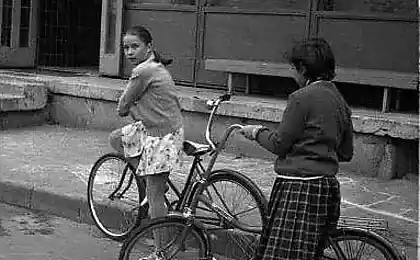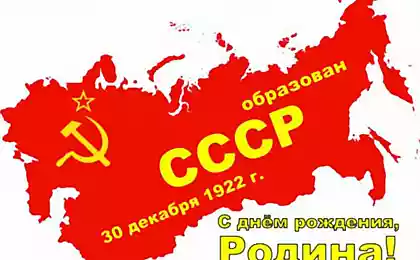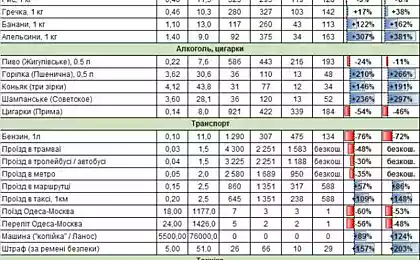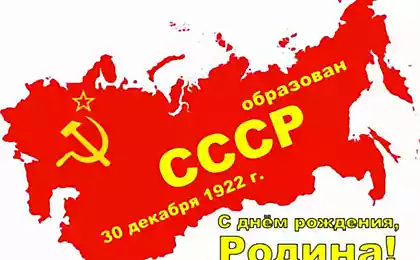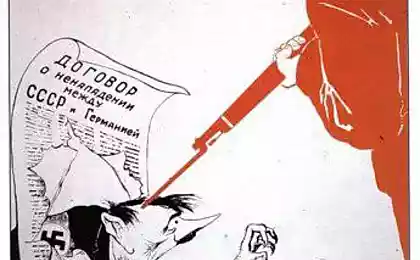853
Seven myths about the Soviet Union
The Soviet Union was dissolved 22 years ago, December 26, 1991. Outside the former Soviet republics it is widely believed that Soviet citizens fervently want this; that Stalin hated as vile despot; that the socialist economy in the Soviet Union has never worked, and that the citizens of the former Soviet Union prefer the life they live today under capitalist democracy, one that in the fevered language of Western journalists, politicians and historians called the "repressive, dictatorial rule one-party state, led the sclerotic, creaky and unworkable socialist economy ».
Neither of these statements is not true.
Myth 1: "The Soviet Union did not have popular support».
March 17, 1991, nine months before the collapse of the Soviet Union, Soviet citizens went to the polls to vote in a referendum whether they favor the preservation of the USSR. More than three quarters of votes "For". So the majority of Soviet citizens wanted to preserve the Soviet Union and not advocated its disintegration.
Continued under the cut ...
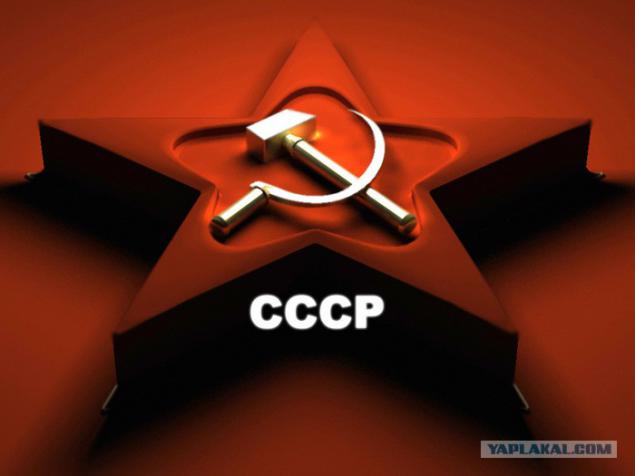
Myth 2. "Russian hate Stalin».
In 2009, the Russian TV channel "Russia" held a three-month survey of more than 50 million Russians to find out who, in their opinion, is the greatest Russians of all time. Prince Alexander Nevsky, which successfully repelled the attempted invasion of the West to Russia in the XIII century, took first place. Second place went to Piotr Stolypin, who served as prime minister during the reign of Tsar Nicholas II and led the agrarian reforms. In third place, behind the Stolypin only 5500 votes, turned Joseph Stalin - a man who "controls" of Western public opinion is regularly described as "a ruthless dictator whose hands the blood of tens of millions." It may denounce the West, which is not surprising, since he had never tried to please the hearts of corporate "giants" that dominate the ideological apparatus of the West, but it seems that the Russians have in this respect a different opinion - one that in no way confirms the statements that the Russians "were victims" and not reached unprecedented heights under the leadership of Stalin.
In the article the magazine «Foreign Affairs» May / June 2004 ("Escape from Freedom: what they think and what they want the Russians") anticommunist Harvard historian Richard Pipes cited a survey in which 10 Russians were asked to list the greatest men and women of all ages. The survey dealt with this important historical figure in any country, not just Russian. Stalin took the fourth place, after Peter the Great, Lenin and Pushkin, to the great irritation of Pipes.
Myth 3. "Soviet socialism did not work».
If this is true, then capitalism, if it is judged by the same canons, generally a complete economic failure. Since its formation in 1928 until 1989, when it was dismantled, Soviet socialism any time except during very difficult years of World War II, he did not face the recession and has always been able to provide full employment. The capitalist economy is a capitalist country has grown relentlessly, without recessions, and the provision of jobs for all their citizens for a full 56 years? (Take the period during which the Soviet economy was a socialist and the country is at war, 1928-1941, and 1946-1989).
In addition, the Soviet economy was growing faster than the capitalist economies, which have been on a par with its level of economic development. And when Stalin launched the first five-year plan in 1928, and is significantly faster than the US economy for most of the existence of the socialist system. Of course, the Soviet economy never caught up and surpassed the economy of the industrialized capitalist countries. But she started the race with a disadvantageous starting position, behind her shoulders was not, as in Western countries, the centuries of slavery, colonial plunder and economic imperialism, and she was constantly the object of Western, particularly American, sabotage and resistance. Particularly harmful to the Soviet economic development was the need for diversion of material and human resources from the military to the civilian economy, to solve the problem of decent potential confrontation between the USSR military aggression west. "Cold War" and the arms race, which confused the Soviet Union in the Battle of the network with a stronger enemy, not state ownership and planning, prevented a socialist economy to overtake the industrialized countries of the capitalist West. And yet, despite the tireless efforts of the West to brake it, the Soviet socialist economy showed positive growth in every year of its existence, peace, putting into practice the material guarantees a dignified life for all. What the capitalist economy can boast such an achievement?
Myth 4. "Now when they try it, the citizens of the former Soviet Union prefer capitalism».
On the contrary, they prefer state planning of the Soviet system, ie, socialism. Responding to a recent poll on the question of which socio-economic system they support, the Russians said:
- State planning and distribution - 58%
- Private property and distribution - 28%
- Hard to say - 14%
- Total - 100%
Pipes cites a survey in which 72 percent of Russians "have said they would like to restrict private economic initiative.»
Myth 5: "Twenty-two years later, citizens of the former Soviet Union believe that from the collapse of the USSR was more good than harm».
Again, not true. According to the just published the results of a poll Gallup, every citizen of 11 former Soviet republics, including Russia, Ukraine and Belarus, which considers the collapse of the Soviet Union, a boon for the country, there are two citizens, who believe that this caused her great harm. Among the persons aged 45 years and older, that is among those who really knew the Soviet system and can compare the share of the latter is significantly increased.
According to another poll, referred Pipes, three-quarters of Russians regret the demise of the Soviet Union, and it is unlikely the reaction of people that you would expect from someone "liberated" from the "repressive state" and "paralyzed sluggish economy." < br />
Myth 6. "The citizens of the former Soviet Union today was better to live».
It should be noted that some of them feel better, yes. But the majority? Given that the majority prefers the former, socialist system current, capitalist, and thinks that the destruction of the Soviet Union has brought more harm than good, we could conclude that the majority of Russians do not feel better, or at least that they do not believe that they live better. This view is confirmed by the data on life expectancy.
The article of the prestigious British medical journal «The Lancet» sociologist David Stuckler and medical researcher Martin McKee show that the transition to capitalism in the former Soviet Union caused a sharp drop in life expectancy, and that "only a little more than half of the former communist countries of today (22 years later! - approx. Trans.) once again reached its pre-transition (socialist) level of life. "The life expectancy of men in Russia, for example, in 1985, was 67 years old. In 2007, she was less than 60 years. Life expectancy has collapsed in the five years between 1991 and 1994. The transition to capitalism is thus provoked mass mortality among the adult population and continues to be the cause of higher mortality rates than would likely be at a more humane socialist system.
A study in 1986 by Shirley Tsiresto and Howard Waitzkin, according to the World Bank showed that the socialist countries of the Soviet bloc have more favorable results in terms of physical quality of life, including life expectancy, infant mortality and calorie intake than the capitalist countries at the same level economic development, and not inferior to the capitalist economy on a higher level of development. (Well, there's companion Howard, as a true European, a few prevaricate, wanting to whitewash capitalism. No country in the world, even the most capitalist development could not and can still provide a high standard of living, which was the citizens of the USSR. Under quality of life we are former Soviet citizens who understands not only the material conditions of life, but also the spiritual benefits provided by society for all and the special condition of mental and moral comfort in a society that no money will change. - approx. edition of the site RP) < br />
With regard to the transition from one-party state to multi-party democracy, Pipes refers to a survey showing that Russians consider democracy fraud. More than three-quarters support the position that "democracy is a facade for a government controlled by rich and powerful clique».
Who's to say that the Russians are not perceptive?
Myth? 7. "If the citizens of the former Soviet Union really want to return to socialism, they have just voted for him».
If only it were so easy! The capitalist system is arranged so that the public policies that suited the capitalists, but not that popular among the people, if it is popular, is contrary to the interests of the capitalist.
For example, the United States still does not have a national health insurance for all. Why, if according to opinion polls, most Americans want it. Why do not they just vote for him? The answer, of course, that there are powerful capitalist interests, mainly private insurance companies, which are using their wealth and connections, does not allow for such a public policy that would reduce their profits. What is popular among the population, unfortunately, not always prevails in the society, because those who own and control its economy, always use his wealth and connections to dominate the political system of the country, winning the competition between the interests of the elite and the interests of the people. According to Michael Parenti, "Capitalism - is not only an economic system, it is the whole social order. Once it is installed, it is not "vygolosuesh" the existence of elected socialists or communists. They can take formal positions, but the wealth of the nation, the basic property relations, Life-sustaining laws, the financial system and debt structure, along with the national media, the justice system and public institutions - all this serves the interests of capital, and not the people ».
Russian return to socialism, is most likely to occur the next time the same way as it did the first time - by revolution, not through elections. Revolutions are not because people prefer a better system than the one in which they now live. Revolutions occur when life is no longer possible to live in the old way - and the Russians have not yet reached the point where the life they live today, would be a completely unbearable.
Interestingly, the poll of Russians in 2003 contained a question of how they would react if the Communists would seize power. Almost a quarter support the new government, one in five will cooperate with him, 27 percent will take it, 16 percent emigrate and only 10 percent would actively resist it. In other words, every citizen of Russia, who have actively opposed the communists, would four or five of those who support the Communists, or to cooperate with them, and three that they will fully which again would have been impossible for the reaction of people who were happy to get out of under what we call "the yoke of communist rule».
Thus, the elimination of the Soviet Union regrets the people who know firsthand about life in the USSR (not according to Western journalists, politicians and historians who know the Soviet socialism only through the prism of its capitalist ideology.) Now that they have behind them more than two a decade of experience of multi-party democracy, private enterprise and the market economy, the Russians do not consider these institutions "miracles", which they are trying to present our Western politicians and the media. The majority of Russians would prefer to return to the Soviet system of state planning, that is, socialism.
But the realities of Russian society are hidden behind a blizzard propaganda of the media, whose intensity peaks every year on the anniversary of the demise of the Soviet Union. From us want us to believe that socialism, where it was tested in practice, it was allegedly publicly despised and supposedly was not able to carry out the people's aspirations, but just the same the other way around.
Not surprisingly, the anti-Soviet views prevail in the midst of the capitalist world. The Soviet Union condemned in the West, almost all: the Trotskyites - for socialism in the USSR was built under the leadership of Stalin (and not their leader Trotsky); Social Democrats - because the Council welcomed the revolution and rejected capitalism; capitalists - for obvious reasons, for them there was no place; the media - because they are in the hands of the capitalists; zavedeniya- training because their educational programs, ideological orientation and political and economic research is directly dependent on the capitalists.
So the anniversary of the liquidation of the Soviet Union should not be surprised that political enemies of socialism put the Soviet Union did not as it was in reality, ignore what really reached the socialist economy, and what is now really hungry for those who proved that socialism deprived.
Stephen Gowans
Istochik
Translation Irina Malenko
Source:
Neither of these statements is not true.
Myth 1: "The Soviet Union did not have popular support».
March 17, 1991, nine months before the collapse of the Soviet Union, Soviet citizens went to the polls to vote in a referendum whether they favor the preservation of the USSR. More than three quarters of votes "For". So the majority of Soviet citizens wanted to preserve the Soviet Union and not advocated its disintegration.
Continued under the cut ...

Myth 2. "Russian hate Stalin».
In 2009, the Russian TV channel "Russia" held a three-month survey of more than 50 million Russians to find out who, in their opinion, is the greatest Russians of all time. Prince Alexander Nevsky, which successfully repelled the attempted invasion of the West to Russia in the XIII century, took first place. Second place went to Piotr Stolypin, who served as prime minister during the reign of Tsar Nicholas II and led the agrarian reforms. In third place, behind the Stolypin only 5500 votes, turned Joseph Stalin - a man who "controls" of Western public opinion is regularly described as "a ruthless dictator whose hands the blood of tens of millions." It may denounce the West, which is not surprising, since he had never tried to please the hearts of corporate "giants" that dominate the ideological apparatus of the West, but it seems that the Russians have in this respect a different opinion - one that in no way confirms the statements that the Russians "were victims" and not reached unprecedented heights under the leadership of Stalin.
In the article the magazine «Foreign Affairs» May / June 2004 ("Escape from Freedom: what they think and what they want the Russians") anticommunist Harvard historian Richard Pipes cited a survey in which 10 Russians were asked to list the greatest men and women of all ages. The survey dealt with this important historical figure in any country, not just Russian. Stalin took the fourth place, after Peter the Great, Lenin and Pushkin, to the great irritation of Pipes.
Myth 3. "Soviet socialism did not work».
If this is true, then capitalism, if it is judged by the same canons, generally a complete economic failure. Since its formation in 1928 until 1989, when it was dismantled, Soviet socialism any time except during very difficult years of World War II, he did not face the recession and has always been able to provide full employment. The capitalist economy is a capitalist country has grown relentlessly, without recessions, and the provision of jobs for all their citizens for a full 56 years? (Take the period during which the Soviet economy was a socialist and the country is at war, 1928-1941, and 1946-1989).
In addition, the Soviet economy was growing faster than the capitalist economies, which have been on a par with its level of economic development. And when Stalin launched the first five-year plan in 1928, and is significantly faster than the US economy for most of the existence of the socialist system. Of course, the Soviet economy never caught up and surpassed the economy of the industrialized capitalist countries. But she started the race with a disadvantageous starting position, behind her shoulders was not, as in Western countries, the centuries of slavery, colonial plunder and economic imperialism, and she was constantly the object of Western, particularly American, sabotage and resistance. Particularly harmful to the Soviet economic development was the need for diversion of material and human resources from the military to the civilian economy, to solve the problem of decent potential confrontation between the USSR military aggression west. "Cold War" and the arms race, which confused the Soviet Union in the Battle of the network with a stronger enemy, not state ownership and planning, prevented a socialist economy to overtake the industrialized countries of the capitalist West. And yet, despite the tireless efforts of the West to brake it, the Soviet socialist economy showed positive growth in every year of its existence, peace, putting into practice the material guarantees a dignified life for all. What the capitalist economy can boast such an achievement?
Myth 4. "Now when they try it, the citizens of the former Soviet Union prefer capitalism».
On the contrary, they prefer state planning of the Soviet system, ie, socialism. Responding to a recent poll on the question of which socio-economic system they support, the Russians said:
- State planning and distribution - 58%
- Private property and distribution - 28%
- Hard to say - 14%
- Total - 100%
Pipes cites a survey in which 72 percent of Russians "have said they would like to restrict private economic initiative.»
Myth 5: "Twenty-two years later, citizens of the former Soviet Union believe that from the collapse of the USSR was more good than harm».
Again, not true. According to the just published the results of a poll Gallup, every citizen of 11 former Soviet republics, including Russia, Ukraine and Belarus, which considers the collapse of the Soviet Union, a boon for the country, there are two citizens, who believe that this caused her great harm. Among the persons aged 45 years and older, that is among those who really knew the Soviet system and can compare the share of the latter is significantly increased.
According to another poll, referred Pipes, three-quarters of Russians regret the demise of the Soviet Union, and it is unlikely the reaction of people that you would expect from someone "liberated" from the "repressive state" and "paralyzed sluggish economy." < br />
Myth 6. "The citizens of the former Soviet Union today was better to live».
It should be noted that some of them feel better, yes. But the majority? Given that the majority prefers the former, socialist system current, capitalist, and thinks that the destruction of the Soviet Union has brought more harm than good, we could conclude that the majority of Russians do not feel better, or at least that they do not believe that they live better. This view is confirmed by the data on life expectancy.
The article of the prestigious British medical journal «The Lancet» sociologist David Stuckler and medical researcher Martin McKee show that the transition to capitalism in the former Soviet Union caused a sharp drop in life expectancy, and that "only a little more than half of the former communist countries of today (22 years later! - approx. Trans.) once again reached its pre-transition (socialist) level of life. "The life expectancy of men in Russia, for example, in 1985, was 67 years old. In 2007, she was less than 60 years. Life expectancy has collapsed in the five years between 1991 and 1994. The transition to capitalism is thus provoked mass mortality among the adult population and continues to be the cause of higher mortality rates than would likely be at a more humane socialist system.
A study in 1986 by Shirley Tsiresto and Howard Waitzkin, according to the World Bank showed that the socialist countries of the Soviet bloc have more favorable results in terms of physical quality of life, including life expectancy, infant mortality and calorie intake than the capitalist countries at the same level economic development, and not inferior to the capitalist economy on a higher level of development. (Well, there's companion Howard, as a true European, a few prevaricate, wanting to whitewash capitalism. No country in the world, even the most capitalist development could not and can still provide a high standard of living, which was the citizens of the USSR. Under quality of life we are former Soviet citizens who understands not only the material conditions of life, but also the spiritual benefits provided by society for all and the special condition of mental and moral comfort in a society that no money will change. - approx. edition of the site RP) < br />
With regard to the transition from one-party state to multi-party democracy, Pipes refers to a survey showing that Russians consider democracy fraud. More than three-quarters support the position that "democracy is a facade for a government controlled by rich and powerful clique».
Who's to say that the Russians are not perceptive?
Myth? 7. "If the citizens of the former Soviet Union really want to return to socialism, they have just voted for him».
If only it were so easy! The capitalist system is arranged so that the public policies that suited the capitalists, but not that popular among the people, if it is popular, is contrary to the interests of the capitalist.
For example, the United States still does not have a national health insurance for all. Why, if according to opinion polls, most Americans want it. Why do not they just vote for him? The answer, of course, that there are powerful capitalist interests, mainly private insurance companies, which are using their wealth and connections, does not allow for such a public policy that would reduce their profits. What is popular among the population, unfortunately, not always prevails in the society, because those who own and control its economy, always use his wealth and connections to dominate the political system of the country, winning the competition between the interests of the elite and the interests of the people. According to Michael Parenti, "Capitalism - is not only an economic system, it is the whole social order. Once it is installed, it is not "vygolosuesh" the existence of elected socialists or communists. They can take formal positions, but the wealth of the nation, the basic property relations, Life-sustaining laws, the financial system and debt structure, along with the national media, the justice system and public institutions - all this serves the interests of capital, and not the people ».
Russian return to socialism, is most likely to occur the next time the same way as it did the first time - by revolution, not through elections. Revolutions are not because people prefer a better system than the one in which they now live. Revolutions occur when life is no longer possible to live in the old way - and the Russians have not yet reached the point where the life they live today, would be a completely unbearable.
Interestingly, the poll of Russians in 2003 contained a question of how they would react if the Communists would seize power. Almost a quarter support the new government, one in five will cooperate with him, 27 percent will take it, 16 percent emigrate and only 10 percent would actively resist it. In other words, every citizen of Russia, who have actively opposed the communists, would four or five of those who support the Communists, or to cooperate with them, and three that they will fully which again would have been impossible for the reaction of people who were happy to get out of under what we call "the yoke of communist rule».
Thus, the elimination of the Soviet Union regrets the people who know firsthand about life in the USSR (not according to Western journalists, politicians and historians who know the Soviet socialism only through the prism of its capitalist ideology.) Now that they have behind them more than two a decade of experience of multi-party democracy, private enterprise and the market economy, the Russians do not consider these institutions "miracles", which they are trying to present our Western politicians and the media. The majority of Russians would prefer to return to the Soviet system of state planning, that is, socialism.
But the realities of Russian society are hidden behind a blizzard propaganda of the media, whose intensity peaks every year on the anniversary of the demise of the Soviet Union. From us want us to believe that socialism, where it was tested in practice, it was allegedly publicly despised and supposedly was not able to carry out the people's aspirations, but just the same the other way around.
Not surprisingly, the anti-Soviet views prevail in the midst of the capitalist world. The Soviet Union condemned in the West, almost all: the Trotskyites - for socialism in the USSR was built under the leadership of Stalin (and not their leader Trotsky); Social Democrats - because the Council welcomed the revolution and rejected capitalism; capitalists - for obvious reasons, for them there was no place; the media - because they are in the hands of the capitalists; zavedeniya- training because their educational programs, ideological orientation and political and economic research is directly dependent on the capitalists.
So the anniversary of the liquidation of the Soviet Union should not be surprised that political enemies of socialism put the Soviet Union did not as it was in reality, ignore what really reached the socialist economy, and what is now really hungry for those who proved that socialism deprived.
Stephen Gowans
Istochik
Translation Irina Malenko
Source:

